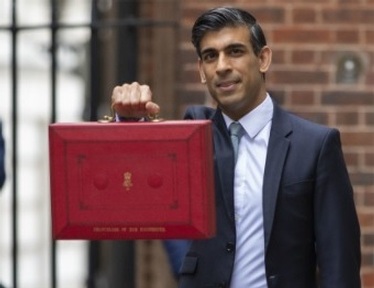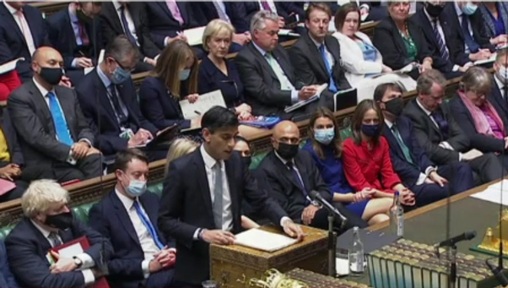Budget: Home care leader says Chancellor 'missed' chance to invest in care
“It makes little sense to neglect people at home" and "wait until they reach crisis point” says a home care leader who has described Chancellor Rishi Sunak’s Budget and Spending Review as a “missed opportunity” to help those needing care.

Dr Jane Townson, the chief executive of Homecare Association, which represents home care providers, said: “Greater investment is needed in home care and community support to grow and develop the workforce and innovate, so we can enable people to live well at home, extend healthy life expectancy, reduce inequalities, take pressure off the NHS and reduce costs for the health and care system.”
Mr Sunak’s Budget was described as failing “to acknowledge the value of social care to the economy" which contributes an estimated £50.3bn and provides over 1.5m jobs, "of which 735,000 are in home care."
“Demand for home care is rising, and yet more care workers are leaving and we have more difficulty recruiting than we can ever remember”, Dr Townson added.
Over 15m people receive home care
Rishi Sunak’s Budget on 27 October was on the same day as the Comprehensive Spending Review (CSR) which sets out the government’s spending priorities for the next three years, from 2022-23 to 2024-25. But there was little mention of adult social care in it.
The Chancellor did announce a rise in the National Living Wage from £8.91 per hour to £9.50 which will come into effect from 1 April next year.
More than 15m people at any one time receive or need support and care in their own homes, either from unpaid informal carers or paid-for home care workers.
The Homecare Association is now calling on the government to make extra funding available urgently to enable care workers to receive wages equivalent to Band 3 healthcare assistants in the NHS with 2+ years’ experience (£21,777 p.a., or £11.14 per hour). The Association calculates this will require an extra £1.72bn per year overall across the UK.
Its latest Homecare Deficit report shows the number of home care hours bought by public sector organisations has risen by 11 per cent in the UK overall. However, only one in eight of public organisations that provided figures are paying an average price at, or above, the Homecare Association’s Minimum Price for Homecare of £21.43 per hour.
This figure is the "absolute minimum required", says the chief executive, to ensure compliance with employment and care regulations and to operate sustainably.
Councils paying ‘scandalously low rates’

“A number of councils are paying scandalously low fee rates, which do not even cover care workers' wages and on-costs, leaving less than nothing to cover the operating costs of a regulated home care service", Dr Townson said.
Home care providers are reporting a 75 per cent fall in job applications since January 2021.
“Although the additional £162.5m announced to support workforce capacity will help in the short-term, it amounts to only £100 per member of the care workforce", said Dr Townson.
The Chancellor's Budget revealed new grant funding for councils of £4.8bn over the next three years.
“The extra £1.6bn per year over three years that is going to local Government is also welcome, but there is no guarantee that it will be directed towards social care.
"If it does, it will all be absorbed in covering the rise in the legal minimum wage, which we know is inadequate to compete with other sectors for scarce labour.”
Poor pay and unmet care needs
Mr Sunak’s Budget and CSR document mentioned the previously announced new Health and Social Care Levy, which it said would deliver £5.4bn of extra funding to reform adult social care.
The Treasury document stated: ‘Supporting the health and social care systems is one of the government’s top priorities.The government is also delivering on its commitments to reform social care for the long term'.
It stated the Levy, along with a rise in the rates of dividend tax, ‘will raise around £13 billion per year for spending on health and social care across the UK’ and ‘will end unpredictable costs for people’ in England by introducing a cap of £86,000 for personal care costs and expanding the means tested support to people with less than £100,000 in relevant assets.
Dr Townson said: “Even combined with the Health and Social Care Levy these measures do not go far enough to address the poor pay, terms and conditions of employment which limit growth and development of the workforce to address current and unmet needs.”
Mr Sunak announced almost £6bn for the NHS, on top of a large share of the funds raised over the next three years from the new health and social care levy.
“Councils report being deluged with requests for help from older and disabled people in the community, which they are unable to support", added Dr Townson.
“Meanwhile, NHS trusts are struggling to discharge people from hospital due to lack of capacity in social care and community services. This makes it difficult to reduce waiting lists as swiftly as required, regardless of how much extra funding is poured into the NHS.” 
Mr Sunak announced Universal Credit claimants can keep more of the money they earn with Universal Credit taper rate being cut by eight per cent. The amount people can earn before starting to lose the benefit will also rise by £500 a year.
Along with home care providers, charities have shared their disappointment over the Chancellor's speech.
Gavin Terry, head of policy at Alzheimer’s Society said: “While some additional local funding has been announced, it’s nowhere near enough to prop up social care until 2023. This will only lead to the increased rationing of care, which is already spread dangerously thin."
Caroline Abrahams, charity director of Age UK, said: "Today, social care needed a big injection of guaranteed, additional funding for now and the future, but the Chancellor didn't deliver it."
Latest News
 29-Jul-24
Dementia Bus gives carehome.co.uk staff insight into life with dementia
29-Jul-24
Dementia Bus gives carehome.co.uk staff insight into life with dementia
 27-Jul-23
UK's top home care agencies in 2023 revealed
27-Jul-23
UK's top home care agencies in 2023 revealed
 30-Nov-22
A quarter of older people keep their falls secret from family
30-Nov-22
A quarter of older people keep their falls secret from family
 29-Nov-22
'Covid-19 has not gone away' say terminally ill
29-Nov-22
'Covid-19 has not gone away' say terminally ill
 28-Nov-22
IT consultant who received poor care opens 'compassionate' home care business
28-Nov-22
IT consultant who received poor care opens 'compassionate' home care business